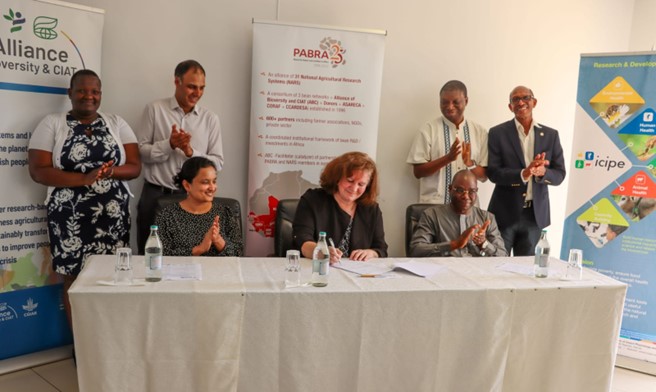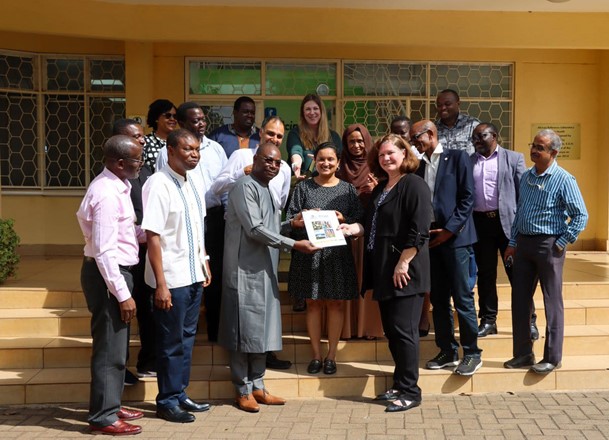By Esther Nzuki
Collaboration is a key driver of overall success and innovation: Doreen Lorenzo.
Studies have shown that Africa is making significant strides in promoting gender equality and policies across different sectors including Agriculture. By closing the gender gap it is estimated that total agricultural output in developing countries will increase by 2.5% to 4 % and reduce the number of hungry people by 12% to 17% globally. This is a call for joint partnerships tabling innovative ideas that will bring agriculture to the forefront of efforts to reduce malnutrition, enhance food security, and generation of income, even more considering women, children and the youth who are vulnerable.
The Alliance of Bioversity International and CIAT (The Alliance) through the Pan African Bean Research Alliance (PABRA) in partnership with the International Centre of Insect Physiology and Ecology (ICIPE), are poised to revolutionize the agricultural landscape by harnessing the potential of beans, fruit trees and edible insects through their Building Equitable Climate-Resilient African Bean & INsect Sectors (BRAINS) initiative. BRAINS will be implemented across 15 sub-Saharan African countries, directly benefitting five million small holder farmers, 2.5 million consumers and school-age children, and a range of value chain actors. Indirectly, BRAINS will profit 50 million consumers businesses and households.
On Tuesday, 30th January 2024, The Alliance through PABRA in collaboration with ICIPE signed an agreement of the CAD $20million grant which is part of a CAD $78 million development funding by the Government of Canada that was announced by Minister Sajjan during his visits to Ethiopia and Egypt highlighting Canada’s commitment to food security and nutrition in Africa.

Through BRAINS, The Alliance through PABRA and icipe will collaborate with national agricultural research institutes, through a South-South participatory development approach, to integrate bean, fruit trees systems and insects for food and feed farming. The systems will be complemented with components of the icipe climate-smart push-pull technology, which intercrops legumes and fodder grass to control cereal pests; and the Centre’s modern, climate-smart and sustainable beekeeping technologies. The immediate expected outcome is enhanced business skills, equitable access to resources and agency for women and youth in bean and insect- based production and value chains. Increased understanding of equitable access to, climate-smart agricultural technologies for bean insect and smallholders, MSMEs, and Cooperatives and enhanced access by bean and insect-based smallholders, rural women, and youth entrepreneurs to sources of sustainable finance to fuel uptake of climate adaptation technologies.
The Alliance-PABRA and icipe will leverage each other’s capacities and partnerships to elevate value chains of target commodities. The two organisations will complement each other, share experiences and facilities and expand partnerships and ultimately deliver the right products to catalyse women and youth farmers and entreprenerus; attract investments and diversify portifolios to increase climate resilience.” – Jean Claude Rubyogo Bean Programme Leader & Director, PABRA, Alliance of Bioversity and CIAT
Integrating beans, fruit trees and edible insects, will greatly contribute to nutrition security providing the sub-Saharan African Communities with access to affordable and nutritious food options and a platform for positive social change. Beans, known for their nutritional richness and adaptability, contribute significantly to improving diets and addressing malnutrition and can thrive in various climates making them a resilient crop, crucial in the face of challenging weather patterns. On the other hand, fruit trees provide additional nutritional benefits, contribute to soil health and create microclimates conducive to sustainable agriculture. Edible insects rich in protein make them a viable option for protein production and integrating them into agriculture offers a sustainable alternative to conventional farming.
The BRAINS partnership will co-develop demand-led, climate-adapted bean varieties and fruit trees, primarily mango and avocado, supported by environmentally friendly pest and disease management options; organic soil fertility enhancement, through insect-based frass biofertilisers; and enhanced pollination services by the bees. Moreover, beans enhance nitrogen fixation and soil enrichment; fruit trees and beekeeping-friendly trees are perennial and drought-tolerant, thus helping to protect landscapes, restore soil function and fertility, and helping in carbon sequestration.” – Dr Sunday Ekesi, Head, Capacity Building and Integrated Sciences, icipe.
The agreement signing culminated in a vibrant display of innovation and collaboration between PABRA and ICIPE, highlighting the diverse nutritional benefits of beans and insect-derived products, and use of biopesticides within the context of integrated pest management (IPM).

